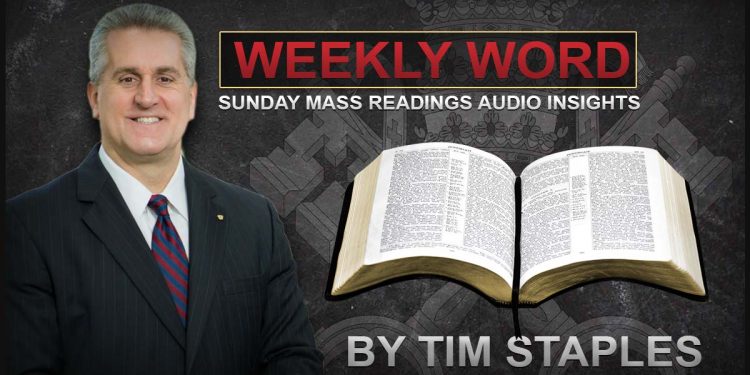24th Sunday In Ordinary Time

“If You Want Mercy and Forgiveness, Have Mercy and Forgive”
Hello, apostolic insiders. Welcome to the Staples household. Once again, it is I can’t believe it. The 24th Sunday of ordinary time. We are moving quickly toward Advent and Mary, what comes after Advent creates this mass? That’s right. My little six year old knows what comes after Advent. Anthony, I’ll bet you knew that as well. Yes. It’s quickly coming upon us, but we’re in the 24th Sunday of ordinary time right now.
And the readings this week, I can’t use the word awesome anymore. My wife said, Don’t do that. Are incredible. And you know, a little bit surprising because if you remember three weeks ago and then two weeks ago, we were focusing on the authority of the papacy, you know, the authority of the church. And then a week ago, we turned to an emphasis on evangelization.
The idea is the church is moving us to consider that we we aren’t we haven’t been given these great gifts of the the authority of the church of the papacy in particular, so that we can have infallible certainty concerning the truths of our faith. We weren’t given these great gifts. So we can just, you know, say, wow, what a great gift and sit around fat, dumb and happy.
No, we’re called to evangelize, to bring those gifts to others. All right. And we got the point here over the last three weeks, but now there’s a kind of a change in program and we move toward the theme of unforgiveness and mercy right now. Why would that be right? Some might think that’s kind of a strange twist. No, it’s not at all.
Because the church is turning us toward what you know, Pope Francis, I think, has been right on recently. He’s he said in so many different ways and in different times. And he’s in particular chastised we Americans and I think rightfully so, if you remember, Pope Francis has said numerous times that we tend in America to focus on the sins below the waist.
Right. And I think he’s painfully correct in that. Now, Pope Francis is not saying that the sixth commandment and the ninth commandment are not important. That’s nonsense. Be quiet. That’s not what he’s saying. Right? Of course, our lady of Fatima pointed out that that, you know, as she said to the CIA and to the children when they saw souls falling like snowflakes into hell, she said the majority of them are going to hell because of the sixth and ninth Commandments.
And, you know, and the pope is not minimizing that at all. But what he is pointing out is there are higher sins, hierarchically that are more grave than the sons, than the sins below the waist. In fact, you heard him talk more than one occasion. He’ll reference Dante’s famous angelic sins. Right. And of course, this comes from Thomas Aquinas, who taught so beautifully that, of course, the angels don’t have a lower nature like we do, so they can’t be tempted with a lower nature that they don’t have.
And so they can only be tempted by, you know, sins like pride and envy that appeal to the higher nature. Well, we have a higher nature, and we also have that lower nature. And, you know, we tend to focus again on the sins and the passions and such of the lower nature. But what about the angelic sins? These are the more grave sins, pride, envy.
These are the most deadly sins. And I have to say it again, this isn’t to minimize the sins, quote below the waist because they’ll all take you to the same hell. But we must not forget, as Pope Francis said, you know, even though sodomy is such an intensely grave sin, because it’s one of the fourth sense, it cries out to heaven for vengeance.
Right. But Pope Francis points out there are three other ones, right? Murder, the killing of the innocent. In Genesis chapter four, verse ten, The oppression of the poor in Exodus two, verse 23. And how about the defrauding of workers of their just wages in James chapter five verse, for these are all sins that cry out to heaven for vengeance.
And as Pope Francis says, you know, we don’t seem to have as much concern about, you know, people not being paid just wages and, you know, these multi, multi billion billion zillion heirs who forget about the little guys that can’t even pay their rent because they can’t make a living wage. But anyway, it’s something to remember here. I so I think Pope Francis is right on here in in helping us as I think Holy Mother Church is doing this week turning our gaze toward the higher sense.
And among these higher sins, anger right unforgiveness are way up there that can destroy us. In fact, unforgiveness. My friends, as we’re going to see in crack, it’s beautifully laid out, will destroy you, will take away grace and cut you off from the life of God in a heartbeat. Let’s begin with the first reading from Syriac Chapter 27, verse 30.
I got to go fast here. I wish we could read it all, but we’re not just going to pick out some of the verses. Syriac 827, verse 30 Anger and Wrath. These are also abominations and the sinful man will possess them. Notice again, we’re starting with anger and wrath. Why? Because as we’ll see in this reading, anger and wrath will lead to vengeance and unforgiveness.
Yes, that will destroy your soul. Of course, anger can be righteous if it’s ordered in accordance with right reason. Jesus got angry on numerous occasions through moneychangers. You know, the tables over got Metal Whip out of court. So there is a righteous anger. But notice here we’re talking about an anger that’s not ordered in accordance with right reason.
And you know that here because it says anger and wrath. These are abominations and the sinful man will possess them. Then notice now we go to zero. Sarah eight one he that takes vengeance will suffer vengeance from the Lord and he will firmly establish his sins. And then look at verse to forgive your neighbor the wrong he has done.
And then your sins will be pardoned when you pray. Oh my goodness. This is one of the many times we see this is Syriac, by the way, one of the duties of canonical books. And there’s no doubt Jesus is referring back to Syriac 28 to when he gives us the Lord’s Prayer and the teaching that follows that we’re about to look at in a in a little bit here.
But forgive your neighbor the wrong he has done and then your sins will be pardoned when you pray. Notice how anger and wrath and the rest lead to what unforgiveness and my friends, when you fall into that you are on your way to hell. Because if you refuse forgiveness, you will not have your sins forgiven. In fact, listen verse three Does a man harbor anger against another and yet seek for healing from the Lord?
Does he have no mercy toward a man like himself and yet pray for his own sense? If he himself being flesh maintains wrath, will he then seek forgiveness from God, who will make expiation for his sins? In other words, God’s not going to forgive him. So who’s going to make expiation for his sins? No one can. Let’s get down to verse seven Remember the commandments and do not be angry with your neighbor.
Remember the covenant the most high and overlook faults. Now, it’s interesting. The the the artist, the Catholic edition translates that Hebrew word to overlook ignorance. I think that you may be this is one of the few times in a in a be gets it right or better than the RSV Catholic edition when it says remember the covenant the most high and overlooked faults very important point here when we’re talking about the spiritual works of mercy.
Remember there is forgiveness and there is forbearance. We forgive those who ask us for pardon, but we forbear with those who don’t. Those who hate us don’t want forgiveness. Those even that persecute us. We’re called to forbear with them. My friends keep that in mind as we move forward. Now to the Psalm, which I think is so powerful, powerfully place.
Of course we can’t read all of this, but I encourage you to read Psalm 103 versus one through 12. Take some time and meditate on this. That is a psalm of mercy. Psalm 103 I’ll just read the first four verses. Bless the Lord, Oh my soul. And all that is within me. Bless his holy name, Bless the Lord.
Oh, my soul. And forget not all his benefits. Who forgives all your iniquity? Who heals all your diseases? Who redeems your life from the pit and who crowns you with mercy and compassion? I cannot emphasize enough how important it is for us to meditate, sing this song, pray this Psalm, and the other songs of mercy. Psalm 1/18, Psalm 136 Psalm 103 Why?
Because the more we meditate on what God has forgiven us for, there is zero chance that we are going to be judging anybody else or looking down at anyone. Because my friends, each and every one of us, each one of you, they’re listening me right now. Everyone in this room listen to me right now, because the only thing you and I have merited on our own, apart from God, is how that is the only thing we truly deserve.
It is of the mercies of the Lord. It is because of the mercy of the Lord that we are not destroyed, says Lamentations three versus 22 and 23. But listen to this. Let’s get down to verse ten. Wish we could read it all, like I said, but in verse ten, he does not deal with us according to our sins, nor repairs according to our iniquities, for as the heavens are high above the earth, so great, as is mercy toward those who fear him.
As far as the East is from the West so far, does he remove our transgressions? Notice as high as the heavens are above the earth, the ideas, you know, no matter how high you go, you can always go higher. His his mercy is infinite or as far as east from the West. Think about it. You can always go east.
Even if you go east. In the end up west, you can still go eastward, right? You’ll go around circles around the earth. But the point is his mercy as high as the heavens above the earth, as far as east from the West west, his mercy is infinite. We need to meditate upon that in our lives. As we move now to Romans Chapter 14, verses seven through nine.
Although I take a little issue with the choice here of reading, not in the choice of three verses, but they should have added verses ten through 13 here. And I’ll tell you why in a moment. Listen to Romans 12 seven. None of us lives to himself and none of us dies to himself. If we live, we live to the Lord.
If we die, we die to the Lord. So then whether we live or whether we die, we are the Lord’s for to this end, Christ died and lived again. That He might be Lord, both the dead and of the living. That’s the reading for this week. And of course, this goes hand in hand with the song. We have to meditate on the fact that we belong to the Lord and that He is Lord, both of the dead and of the living.
We belong to the Lord. But it’s because of that. Look at verse ten, the very next verse. Why do you then pass judgment on your brother? Or why do you despise your brother? For we shall all stand before the judgment seat of God. That’s what Paul’s talking about here. We belong to the Lord. Therefore, why in the world would you pass judgment on your brother?
Because all of us belong to the Lord. We are all going to be judged by God in verse 12. So each of us shall give account of Himself to God. Then let us no more pass judgment on one another, but rather decide now. Never to put a stumbling block or hindrance in the way of a brother. Again, that theme, which leads us to the gospel, the crescendo.
Matthew 1821 through 35. What a powerful text concerning the forgiveness, the mercy of the Lord. Then Peter came up and said to him, Lord, again, this is Matthew 1821 235 How often shall my brother sin? It gets me and I forgive him as many as seven times. Jesus said, I do not say seven times, but 70 times seven.
And then he gives us the parable, I’m not going to read the whole thing, but powerful parable of the unmerciful servant and we all know the story. You have a servant of of a king, a mighty king, who the king finds out that his servant, who is kind of a servant over the other servants in the realm, but the king discovers this guy owes him 10,000 talents.
So what’s a talent, folks? A talent is like 15 years of wages for a worker, all right, in the first century. So notice the king discovers he owes him ten. Now, in other words, this guy’s been stealing right here. This isn’t something where he just, you know, the king hadn’t paid him enough or he didn’t get a salary.
This boy has been pilfering big time. Okay? I mean, this guy is stolen, So we’re talking. He owes the king £10,000. Think about 10,000 times 15. And that’s how many years, you know, of wages that it would cost here to pay back. So and notice verse 25 says so as he could not pay. So no doubt, think about it.
This guy not just been stealing, he’s been squandering money. This guy’s been party and big time. And so I can’t pay this back. But what does he do? He falls on his knees imploring him, Folks, this is you and I. We have forgiven of so much, my friends. We deserve hell, as I said before. But this man falls on his knees, begs for mercy.
And what does the king do? He forgives him. And then we know the story, right? Because after this incredible forgiveness of this massive amount of debt and by the way, I like the way that the new American Bible says, instead of saying 10,000 talents, I think they did this because people don’t really understand what a talent is to land a denarii.
And that then says when he began reckoning, the king discovered that his servant owed him £10,000. The NAB says a huge amount of money, right? And of course it was 10,000 tons. It’s the more accurate translation. But anyway, then he discovers one of the servants under him who owes a hundred denarii a relative every relative to the, you know, 10,000 talents, 100 denarii, which is roughly a denarius, roughly a day’s wage.
All right. A pittance next to what this man was forgiving of. And what does he do? He seizes him by the throat. Pay what you owe. And the fellow servant fell down and pleaded with him. Have patience and I will pay. Pay you. He refused and went and put the servant in prison till he should pay the debt.
So when the fellow servants saw this, they went to the king. The king discovers and he is livid. And he says, I forgave you. And I like him in verse 32, you wicked servant, If I forgave you all that debt because you pleaded with me, should not you have had mercy on your fellow servant, as I had mercy on you and in anger, His Lord delivered him to the jailers till he should pay all his debt.
So also, my Heavenly Father will do to every one of you if you do not forgive your brother from your heart. Now, I have to say here, folks, this is this is a powerful text concerning the importance, the essential nature of forgiveness. But I also have to say that there is a huge misunderstanding of the nature of forgiveness.
And for whatever reason, it seems to be very popular in Christian culture today when it comes to forgiving, when it comes to the topic of forgiveness and it’s rooted in this, how many of you ever heard this? They say that you have to forgive everyone. Absolutely. Even if they’re not sorry. It’s a very strange thing from a biblical and from a Catholic perspective.
But you’ll hear it commonly. And I can tell you, I have written on this topic, I’ve spoken on it on Catholic ministers live, and every time I do, people will get mad. They get angry. How dare you say you’re saying we don’t have to forgive some people. And yeah, in a sense, yes. And why? Because I mean, the answer is really simple.
If you go to Colossians chapter three, verses 12 and 13, Saint Paul says Put on then as God’s chosen one’s holy and beloved, compassion, kindness, loneliness, meekness and patience for bearing one another. Remember what I said before? Those who don’t ask for forgiveness, for bearing one another, And if one has a complaint against another, forgiving each other as the Lord has forgiven you.
So you must also forgive folks. Saint Paul can’t make it any more plain. We do not. In fact, we cannot forgive those who are not sorry and that do not want forgiveness. This is what is meant by as the Lord is forgiving you. So you must also forgive. God does not forgive. For example, the souls in hell or those who are not sorry for their sins.
He cannot. Folks that would be contrary to his divine wisdom, which is metaphysically absurd. He created is free, and in that sense he respects our freedom. He will, in a sense, allow us to go to hell. I’ve said this to four guys who allow us to go to hell if we want to. He doesn’t force his forgiveness upon us.
He offers his forgiveness, but we have to freely respond and ask for forgiveness. As for John, chapter one, verse nine said, If we confess our sins, he is faithful and just to forgive us our sins. Now, I think the common mistake made is to think that because the Lord’s Prayer says, forgive us our debts as we forgive our debtors.
Right. In Matthew 612, that means we have to forgive even those who don’t want our forgiveness or who are not sorry for what they’ve done. And then, of course, you know, the folks will add Matthew 614 and 15, the first two verses after Jesus gave us the Lord’s Prayer. And they’ll say, look, for Jesus says, for if you forgive them in their trespasses, your Heavenly Father will forgive you.
But if you do not forgive them in their trespasses, near, neither will your Heavenly Father. Forgive your trespasses. See, we have to forgive. And even those who are not sorry right? Wrong folks. That’s not what Jesus said. Remember, whenever you read text of Scripture about forgiveness, they either state plainly or presuppose the truth that forgiveness is always a two way street and God is our paradigm for this principle.
There cannot be forgiveness if only one party is involved. This is why Jesus said in Luke 17, verses three and four. Let me quote Take heed to yourselves If your brother sins, rebuke him. Remember, that’s one of the spiritual works of mercy. Take heed to yourselves. If your brother sins, rebuke him. Major misconception about, you know, Judge not right.
Yes. We don’t judge, as we’ve seen from the Book of Sierra, but we judge actions. Take heed to yourselves. If your brother sends rebuke him and if he repents forgiven, and if he sends against you seven times in the day and turns to you seven times and says, I repent, you must forgive him. Notice Jesus never commands that we forgive everyone.
Only I. I would say everyone who is sorry. Yes. And I would also argue we have to offer forgiveness to all. We as Christians should be known as people who offer forgiveness to all, just as God does. But again, God does not forgive those who are not sorry or who do not ask for forgiveness as pope. Say, John Paul, the second time us in his masterful encyclical, Divas in Misery in Misericordia, Rich in Mercy.
There are never conditions for love, folks. Love is unconditional. We must love our enemies, even those who are persecuting us. And that’s necessary for our salvation. According to Matthew Chapter four, verses 43 and 44. Love your enemies. Pray for those who spitefully use you and persecute you. Why? So that you may be sons of your Heavenly Father. No other words necessary for salvation.
This is an essential part of loving as Christ loved right? That’s the new commandment of the Gospel. John 1334 Love one another as I have loved you. But again, I must emphasize Jesus loves everyone, but Jesus does not forgive everyone. Otherwise everyone would be in heaven. And we know that’s not true. This is so because forgiveness has conditions.
Let me quote Pope Saint John Paul The second I think this is in section 18 of that masterpiece encyclical on Mercy in no passages of the gospel message, does forgiveness or mercy as its source mean indulgence toward evil, towards scandals, towards injury and insult? In any case, reparation for evil and scandal, compensation for injury and satisfaction for insult are conditions for forgiveness.
Now, again, of course, we’re called to forgive our enemies as well. We’re called to offer forgiveness to all and to forgive anyone, including enemies, whoever asks for forgiveness. But the point is, we you know, I guess I could say it this way. We don’t need anyone’s permission to love them. We’re commanded to love everyone. In that sense, love truly is a one way street in the sense that we’re called to will the good of the other, as Saint Thomas Aquinas defined love.
And that must be toward every single soul. Or, as Saint Paul says it in First Corinthians 13 five, Love does not consider its own interests. It only considers the other in its most pure and perfect form. Love is all the more beautiful, of course, when it’s reciprocated, but the reciprocation is not necessary for the love to exist away.
There can be no forgiveness if it’s a one way street, which, by the way, leads to another common error. I want to mention real quick. I know we’re going kind of long, but this is important because folks will say, But didn’t Jesus forgive you? Even those who were putting him to death when he was on the cross, when he said, forgive them, Father, for they know not what they do.
Actually, that too, is not true. Jesus did not forgive everyone when he was on the cross. These words forgive them. Father were directed at all of us because all of us put Jesus on the cross, my friends. But this was a petition to the Father for the forgiveness of all. And this is the teaching of the church. According to the Catechism of the Catholic Church, Sections 2857 through 2865.
Forgive them, Father, for they do not know what they do was the fifth of seven petitions made on the cross by Jesus. And these seven petitions have always been understood in our Catholic tradition to be the summation of what the catechism says in Section 17. Let me quality. These seven petitions are the summation of all the good things which we must hope for and which our Heavenly Father wants to give us.
Close quote, in fact, that every mass these seven petitions represent the heart and soul of all of our petitions, because they were first the petitions of our Lord and master, but because Jesus petitioned the Father for all to be forgiven, that does not mean all are actually forgiven. Folks, we are not Universalists. No, there are conditions to forgiveness as Pope Saint John Paul the second said, as I quoted earlier, the sinner must be sorry for his sins if he’s going to experience the forgiveness Jesus offered in that fifth of seven petitions on the cross.
At any rate, I know it’s a popular myth that says somehow we humans are called to do more than God does when it comes to forgiving those who sinned against us and are not sorry. But actually we are never called to go beyond what God does. We’re called to imitate what God did in Jesus Christ. I’ll leave you with Colossians three verses 12 and 13 once again put on then as God’s chosen one’s holy and beloved compassion, kindness, loneliness, meekness and patience, forbearing one another.
And if one has a complaint against another, forgiving each other as the Lord is forgiving you so you also must for give what a powerful several readings this week. My friends, this week let’s examine our conscience and make sure we are not holding anger, wrath and God forbid, unfair given us in our souls toward any one. Because as Jesus said it in Matthew chapter six, verse 14 and 15, if you do not it well, if you forgive your brother, then God will forgive you.
But in verse 15, if you do not forgive your brother, his offenses against you, neither will your Heavenly Father forgive you. That is a sure road to hell, my friends. Let us ponder Psalm 1 to 3. Ponder the mercy of God in what is done in our hearts. Mercy, mercy, mercy. James Chapter two, verse 13 says, and I quote, Judgment is without mercy to one who has shown no mercy.
If you want a quick route to hell, then just show no mercy. Matthew Chapter five or seven. Blessed are the merciful, for they shall obtain mercy. You don’t show mercy. You’re not going to have mercy. Gosh, we emphasize justice so much in our culture, right? Where is mercy? What is mercy? The withholding of just punishment as an act of love.
In other words, the punishment is deserved. The withholding of it is called mercy. Oh, my Lord, Do we need mercy in our culture today? Let us remember the Gospel. Jesus makes it so plain. If we would consider how much we’ve been forgiven, we will never be like that unmerciful servant who grabs the other by the throat and demands.
We will beg mercy for all. In Jesus name, God bless you.




